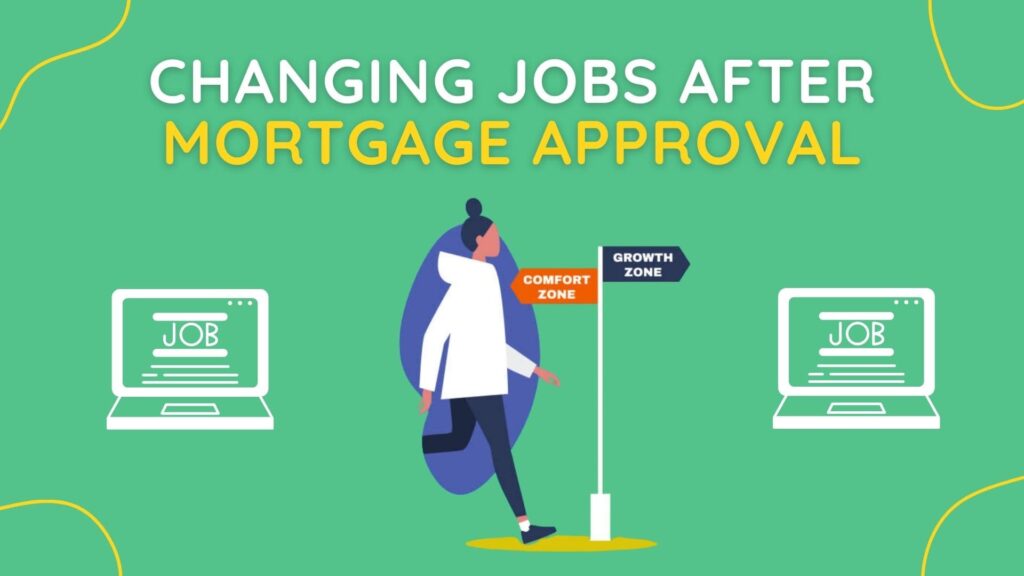
Sammie Ellard-King
I’m Sammie, a money expert and business owner passionate about helping you take control of your wallet. My mission with Up the Gains is to create a safe space to help improve your finances, cut your costs and make you feel good while doing it.

Quickfire Roundup:
If you’ve had a mortgage application approved, you need to tell your lender if you’re about to change jobs.
Mortgage lenders care when these changes take place as your application was approved based on the employment history supplied.
The good news is that if it’s a similar or better job, and it’s not in a completely different industry, many lenders will be good to continue.
Do keep in mind that this is on a case-by-case basis though.
So, you’ve made the right move and consulted a mortgage broker. You’ve been directed to the best deal for you and the mortgage application process is done.
You’re, understandably, super excited about your mortgage offer and your new home but then something happens: you start a new job.
You may well be left wondering if changing jobs after mortgage approval matters and if it will have any impact.
The truth is that many mortgage lenders care if you switch jobs. However, that doesn’t mean that all is lost.
As you read on, I hope that you will understand the impact of changing your job role as well as the steps that you can take to help keep your mortgage offer alive.
Let the latest technology help get you there with the best money savings apps.
Table of Contents
Will lenders care about changing jobs after mortgage approval?
In short, the answer is yes. A mortgage lender will want to know about you switching jobs so that they can reassess their offer.

Of course, you know that your credit history is still the same and you’re confident that you can make the monthly payments, so why do lenders care?
Here’s a look at the top 3 reasons:
Risk of redundancy
When you change your job, your job security also changes. You may be moving on for a higher salary or conditions that are better than your current job, but that’s not always enough to put mortgage lenders at ease.
The phrase that will be ringing loud and clear in the ears of your lender is “Last one in, first one out”.
While this may not always be the case, your lender will see the chances of your being let go as a higher risk.
The impact of a probation period
If you look back to any occasion when you’ve started a new job there’s a good chance that you were given a probation period.
During this time, your employment status isn’t guaranteed as your new employer can show you the door if you fail when it comes to meeting in job requirements.
Most lenders are left worrying about how you’d make the mortgage payments if this happened.
A probationary period is an unknown ground for all parties.
Let the latest technology help get you there with the best money savings apps.
A change in income
As part of your mortgage application, you’ll have jumped through a few hoops and you’ll have had to prove a few things. One of these things would have been your income.
Based on that income you were approved through the loan application process as you’d shown that you could meet the mortgage payments. All of a sudden that proof has gone.
You may have taken a higher salary but without a pay stub, or a few pay slips, in hand, you have no way of proving this just yet.
Does that mean that my mortgage lender will retract my offer?
The unfortunate reality is that changing jobs before mortgage completion is far from ideal.
You will have been offered a particular mortgage having been through the loan approval process, but now everything has changed.
Now, that doesn’t automatically mean that your mortgage lender will withdraw your offer, but it will want to revisit parts of the mortgage process.
To keep the chances of your mortgage loan alive, the best thing to do is talk to your mortgage broker. They can talk to the mortgage lender on your behalf and smooth the way a little.
When they have all of the information, lenders assess you again and will decide if your job change allows them to lend to you still.
Things that can boost the chances of a yes include:
- Demonstrating that frequent job changes aren’t your thing
- Showing that your new job is a permanent position and not a fixed-term contract
- There is no risk of salary decreases
- Your position is in the same industry
- You have a fixed salary
- Providing as much documentation as possible to prove your new income and job security
Factors that are more likely to stall the home-buying process

Just as there are factors that will go in your favour to get a mortgage when you’re changing jobs after mortgage approval, there are others that can cause you issues.
These include:
- Employment history with numerous job changes
- Taking on a role with variable income
- Starting your own business and becoming self-employed
- Taking on a role with a new company with no track history
- Anything that can be seen as a substantial change to what was on your original loan application
You may be tempted to keep your new job before the house sale completing.
Just remember, the terms and conditions state that you must keep them updated, and there is also the chance that they will contact your employer again prior to you finally buying a house.
Let the latest technology help get you there with the best money savings apps.
FAQs
Can a mortgage offer be withdrawn all the way up until the day of completion?
Technically, your mortgage lender could pull the plug on the day of completion. This is extremely rare but it can happen. The best way to avoid any risk of this is to be 100% honest about any change in circumstances.
If you change jobs, move to a self-employed income or go through anything that changes what appeared on your mortgage application, you need to tell them.
Will self-employment mean my mortgage offer will be withdrawn?
If your mortgage application was based on being a contract employee in a salaried position a sudden move to self-employment will cause problems.
Even if you believe that this will lead to a higher income, you have no way of proving this and a loan officer will possibly intervene.
You can still get a mortgage when you’re self-employed but you need the advice of a mortgage broker so that you know how to boost your chances of acceptance.
Final thoughts on how changing jobs affect your mortgage
As part of a mortgage application, lenders verify employment details and satisfy themselves that you can meet the mortgage payments needed for buying a house.
When you switch jobs everything changes and your lender will want reassurances about how your new job will impact your ability to pay.
Switching jobs isn’t necessarily a disaster, but you should get in touch with your mortgage broker as soon as you’re aware of any impending changes.
A job change doesn’t have to stop you from buying a house but can present a few more challenges.
MORE LIKE THIS
Share on social media
Disclaimer: Content on this page is for informational purposes and does not constitute financial advice. Always do your own research before making a financially related decision.



